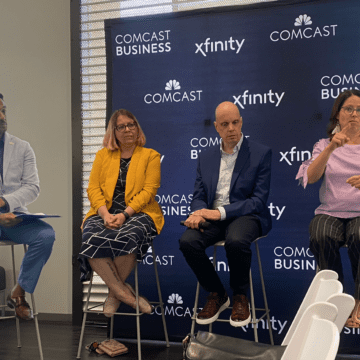Xfinity is rolling out a new service in San Jose to increase accessibility for people who are deaf or hard of hearing.
Xfinity, the national internet service provider for parent company Comcast, launched its in-store American Sign Language (ASL) translation services to the public this week. Xfinity will be the first in the country to offer deaf customers live on-demand, remote ASL interpreting services. The company plans to expand the service to additional stores across the country later this year.
“This is a big deal because now, anybody can walk into the store and get an ASL interpreter on demand,” Kat Zigmont, senior director of operations and deputy director at the World Institute on Disability, told San José Spotlight. “That kind of inclusion might seem trivial, but it’s actually huge.”
The service works similar to a Zoom call, with ASL translation Comcast representatives available for employees and customers to interface with in real time through video calls.
Tom Wlodkowski, vice president of accessibility at Comcast, said the company’s priority is to connect customers.
“We know that technology can level the playing field,” he told San José Spotlight.
Eight Xfinity stores in the Bay Area now offer the ASL virtual remote interpreting service.
Comcast’s decision to roll out the technology in San Jose first is due to the proximity of the California School for the Deaf, located nearby in Fremont. The free public school supports deaf children of all hearing levels and their families, using a bilingual ASL and English approach.
Trina Licht, the school’s outreach specialist, emphasized how essential it is for deaf customers to have ASL-specific translation. She added that communicating through writing can be time-consuming and often not ideal for deaf individuals who may not have the same level of proficiency in English as they do in ASL.
“(Deaf people) are always an afterthought when it comes to new technology,” she said during the panel.
Licht said as the tech world continues to make advancements, it would be nice for people who are deaf or hard of hearing to be considered at the same time as everyone else.
Other disability advocates echoed her sentiment, and made it clear that for-profit and nonprofit partnerships are essential to creating a more accessible community and commercial environment.
“Accessibility is everyone’s job,” Zigmont said.





